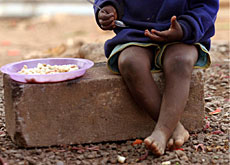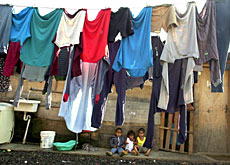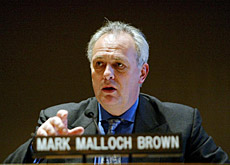NGOs renew calls for increased development aid

Swiss non-governmental organisations (NGOs) have again criticised government development-aid funding ahead of a major United Nations meeting in New York.
They say Switzerland will be one of the few nations at the World Summit next week not to announce an increase of its aid in the years to come.
“By refusing to increase public funding of development aid, Switzerland – along with the United States and Australia – is one of the few OECD [Organisation for Economic Cooperation and Development] countries that will have nothing to offer in New York,” said Bastienne Joerchel of the Swiss Alliance of Development Organisations.
However, the foreign ministry rejected the criticism. A spokesman said Switzerland’s official development aid was considerable, and it was among the top eight OECD countries.
The World Summit will be looking at progress made towards reaching the UN’s Millennium Development Goals set out in 2000.
One of the goals is the eradication of extreme poverty and developed nations are being called on to spend the equivalent of 0.7 per cent of their gross national product (GNP) on official development assistance by 2015.
Swiss President Samuel Schmid will announce in New York that Switzerland is now spending 0.41 per cent of its GNP on development aid, up from 0.37 per cent in 2003. But this figure has been reached by adding costs related to asylum requests, a manoeuvre denounced by NGOs.
Criticism
In April, the head of the United Nations Development Programme slammed the Swiss for not spending enough on official assistance.
A recent peer review carried out by the OECD also called on Switzerland to dig deeper.
Walter Fust, the head of the Swiss Agency for Development and Cooperation, told swissinfo in July that these calls for more spending ignored the budget constraints faced by the government.
But Swiss aid funding remains insufficient for the NGO coalition, which is supported by the environmental association Pro Natura, Amnesty International and the Swiss Federation of Trade Unions.
“Switzerland’s position is in complete contrast with that of European Union member states, who have said they want to increase development aid spending to 0.7 per cent of their GNP by 2015,” said Joerchel.
The coalition had already criticised the government’s development budget in May. It said at the time that this should be raised to 0.56 per cent by 2010 and 0.7 per cent by 2015, in line with UN recommendations.
The coalition said the government should also support initiatives for the introduction of international taxes, such as a levy on jet fuel, to finance more aid. EU finance ministers earlier this year said a kerosene tax could generate up to €7 billion (SFr10.8 billion) a year in funding.
UN Secretary-General Kofi Annan has been pressing the international community to show progress towards meeting the Millennium Goals. In March, he called for some quick decisions from developed nations.
swissinfo with agencies
Millennium Development Goals:
1. Eradicate extreme poverty and hunger.
2. Achieve universal primary education.
3. Promote gender equality and empower women.
4. Reduce child mortality.
5. Improve maternal health.
6. Combat HIV/Aids, malaria and other diseases.
7. Ensure environmental sustainability.
8. Develop a global partnership for development.
Swiss development aid has averaged 0.37 per cent of GNP over the past few years.
In 2002, the government announced it wanted to increase aid to 0.4 per cent of GNP.
Switzerland ranks 15th among developed donor nations based on its GNP percentage.
European Union nations have set themselves a target of 0.7 per cent of GNP by 2015.

In compliance with the JTI standards
More: SWI swissinfo.ch certified by the Journalism Trust Initiative












You can find an overview of ongoing debates with our journalists here . Please join us!
If you want to start a conversation about a topic raised in this article or want to report factual errors, email us at english@swissinfo.ch.